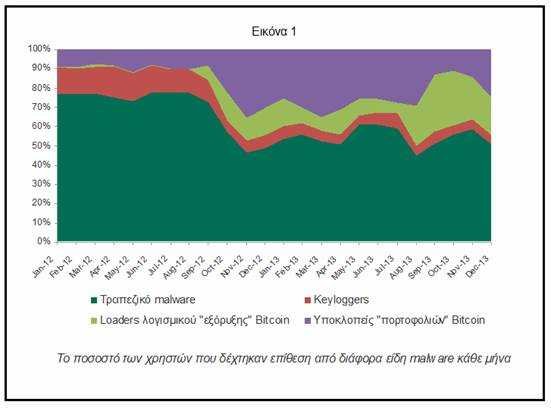According to the study "Financial cyber threats in 2013"Her Kaspersky Lab, financial attacks with malicious Bitcoin programs have become extremely popular with 2013. The number of attacks targeting the digital currency rose more than 2,5 times, touching 8,3 millions of incidents.
Bitcoin was created specifically for making anonymous electronic payments and has become extremely popular in recent years. At the beginning of 2013, at an exchange rate, a Bitcoin was $ 13,6. Until December, it reached record levels, surpassing $ 1.200. During the year, there were several transitions, but from April 2013 onwards, the unit price of the virtual currency has not fallen below $ 80. Inevitably, this has attracted the attention of fraudsters. Bitcoins are often easy prey for digital criminals. If users store bitcoins on their computers in unencrypted form, criminals just need to steal the "digital wallet" file to retrieve information about the "money" found in it and gain access to the victim's account.
Over 30 malware samples associated with financial attacks were selected for Kaspersky Lab's research. Nine of these were the program designed to steal the digital coin. These nine malicious programs were a total of 29% of all financial digital attacks that were implemented using malicious applications.
The tools that digital criminals use to steal bitcoins can be divided into two categories. The first includes programs created to steal digital wallet files. Applications belonging to the second category are designed to be installed software to generate bitcoins (a process known as “mining”) from an “infected” computer. In absolute numbers, bitcoin wallet thieves carried out twice as many attacks in 2013. However, the development of mining tools was much faster.
"In 2013, the value of bitcoins increased more than 85 times, which - of course - caught the attention of digital criminals. By the end of the year, the number of users attacked by malware targeting bitcoins had begun to approach the number of people facing more conventional banking threats. Holders of digital currency should be especially careful, because it is almost impossible to recover their money in case of theft. "This is the inherent risk of using a digital currency, such as Bitcoin, which circulates unchecked by any regulator," said Sergey Lozhkin, Senior Security Researcher at Kaspersky Lab.
For the safe use of digital currencies, Kaspersky Lab experts recommend storing files - "wallets" on encrypted media. For long-term storage, one user he can transfer the files to a specific "wallet" and write down the details on paper. It is also imperative that they protect their computers against malware by using a reliable, comprehensive security suite.
Home users can benefit from using it Kaspersky Internet Security, a complete security solution that includes integrated protection technologies as well as technology Safe Money, which protects user data during bank and electronic payments.
The study "Financial Cyber Threats in 2013” leveraged data voluntarily provided by its users Kaspersky Security Network. Kaspersky Security Network is a global cloud-based infrastructure, which has been developed for immediate processing of depersonalized data about threats faced by users of Kaspersky Lab products.
About Kaspersky Lab
Kaspersky Lab is the largest private security solutions company computers in the world. The company is among the top four security solutions providers in the world*. Throughout its more than 16-year history, Kaspersky Lab has been innovating in the field of security, providing cost-effective solutions to protect users, small, medium and large enterprises. Today, Kaspersky Lab's operations span 200 countries and regions around the world, with the company providing online security to over 300 million users. For more information, visit: www.kaspersky.com.







